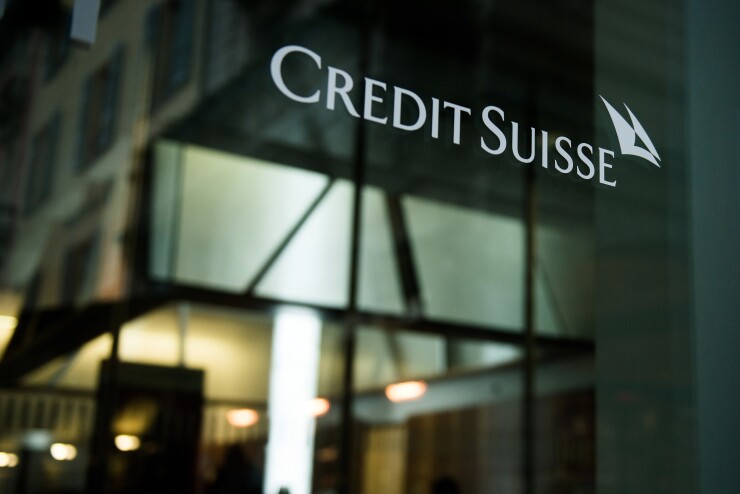U.S. regulators are scrutinizing this month’s implosion of investments that track stock market turmoil, including whether wrongdoing contributed to steep losses for VIX exchange traded products offered by Credit Suisse and other firms, several people familiar with the matter said.
The SEC and the Commodity Futures Trading Commission have been conducting a broad review of trading since Feb. 5, when volatility spiked and investors lost billions of dollars, the people said.
Among those looking into what happened are lawyers in the SEC’s enforcement division, which investigates firms for potential misconduct and fines them if it finds violations of securities laws, two of the people said. There is no indication thus far that specific companies, including Credit Suisse, are being probed.

The scrutiny puts a spotlight on a small corner of the $3.4 trillion ETF industry that lets everyone from hedge funds to mom-and-pop investors engage in complex trading strategies. With losses now piling up, allegations of market manipulation are getting more attention and government watchdogs face questions about why small-time investors were permitted to buy such products in the first place.
An SEC spokesman declined to comment, while CFTC officials didn’t respond to requests for comment.
The investments that blew up two weeks ago move in the opposite direction of the CBOE — a benchmark better known as the VIX that serves as Wall Street’s barometer of market stress. Betting the VIX would fall was for years a winning trade because volatility was close to non-existent.
But that changed Feb. 5 after the Dow had its biggest ever one-day point decline and VIX futures surged. The next day, Credit Suisse said it would liquidate the VelocityShares Daily Inverse VIX Short-Term ETN (XIV), a nearly $2 billion exchange traded note. Meanwhile, the ProShares Short VIX Short-Term Futures ETF (SVXY) plunged 83%.
After the losses, SEC officials reached out to Credit Suisse, a person with direct knowledge of the conversations said. Neither Credit Suisse nor ProShares have been accused of any wrongdoing. The regulators’ examinations are at an early stage and won’t necessarily lead to sanctions or new rules.
Spokesmen for Credit Suisse and ProShares declined to comment.
-
Liquidations and delistings reached 98 in 2016, an all-time high.
January 5 -
These funds have similar goals, but there are significant differences.
November 21 -
Why one asset manager says the high alpha of an equity long/short hedge fund may outweigh the cost benefits of similarly structured mutual funds.
October 20
The VIX is known among traders as the fear gauge and investors often use it to hedge their bullish stock bets, as the index typically rises when shares fall.
It’s calculated from prices for S&P 500 options and reflects expectations for the magnitude of swings in the U.S. stock market. Wagering on the VIX has become increasingly popular in recent years, particularly after CBOE Global Markets introduced futures tied to the index more than a decade ago.
Last week, it emerged that an anonymous whistleblower had alleged to the SEC and CFTC that “rampant manipulation” of the VIX is costing investors hundreds of millions of dollars a month. CBOE, the Chicago-based exchange that controls the VIX, said the report’s conclusions lacked credibility and were “replete with inaccurate statements, misconceptions and factual errors.”
The whistleblower’s claims, made through a Washington lawyer, follow a May report by a University of Texas professor and a Ph.D. student that asserted the process through which VIX futures are settled is subject to rigging.
Chris Concannon, CBOE’s president and chief operating officer, said Feb. 7 that he expected regulators to review some products that track VIX derivatives. Watchdogs would probably examine what information was disclosed to investors, with a particular focus on retail traders, he said on a call with analysts.
CBOE spokeswoman Hannah Randall declined to comment.
Among the issues being examined by the SEC’s enforcement division are why some exchange traded products linked to the VIX didn’t trade as some investors expected, according to two of the people, who like others asked not to be named because the reviews are private.
Both long and short investments focused on volatility were mostly crushed lately.
On Feb. 5, the VIX posted an unprecedented 116% surge. A trader could’ve reasonably assumed the index would come back down the next day. And indeed it did, dropping 20% on Feb. 6. But if they bought Credit Suisse’s XIV or other investments that are designed to move in the opposite direction of the VIX at 4 p.m. on Feb. 5, they would have suffered losses the following day.
Outside the SEC’s enforcement unit, agency officials are taking a thorough look at products based on the VIX, including how the investments are structured, one of the people said. They are seeking to rule out manipulation as a factor in this month’s wild price swings, the person said.
The type of investments that Credit Suisse and ProShares issued are known as inverse exchange traded products because they increase in value when some related asset falls, and vice versa. The space has grown significantly over the past decade; as such products now manage about $33.6 billion, compared with $1.7 billion in 2006, according to research company ETFGI.
Many don’t face the same rules as simpler securities that track the S&P 500 even though they often pursue more complicated investing strategies. Some utilize leverage, which can amplify investment gains but also magnify losses. BlackRock, the world’s biggest provider of ETFs, has called for tougher regulations that would require financial companies to clearly spell out the risks associated with inverse products.
At the CFTC, which oversees futures contracts, regulators are reviewing VIX-related products under its jurisdiction, another person said. FINRA, an industry-funded watchdog that CBOE has hired to conduct surveillance of its markets, also has increased its scrutiny of VIX trading, a person familiar with the matter said last week. The SEC, CFTC and FINRA are coordinating their reviews, one of the people said.
A FINRA spokesman declined to comment.






